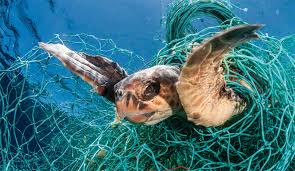Supermarket giant Tesco and consumer goods firm Nestlé have joined a coalition of businesses, non-profits and public sector bodies which have pledged to tackle the 640,000 tonnes of fishing gear abandoned in the world’s oceans each year.
The GGGI currently funnels $1m into these projects annually, but this will rise to $2m next year
The companies are the latest signatories to the Global Ghost Gear Initiative (GGGI), which was set up by non-profit World Animal Protection in 2015 in a bid to help remove some of the millions of abandoned fishing nets, pots and lines that get left in the sea each year.
This waste, also known as ghost gear, is estimated to represent 10% of all marine debris and as much as 70% of all macro-plastic in the ocean.
The GGGI’s 91 supporting organisations, including Lidl, Sainsbury’s, Morrisons, Marks and Spencer (M&S) and Waitrose, have collectively committed to supporting 30 projects addressing ghost gear by 2025.
By joining the initiative, Tesco and Nestlé have also committed to helping establish baselines and contribute to a net reduction of ghost gear in oceans on an annual basis by 2030.
World Animal Protection’s global head of sea change Ingrid Giskes said the move from the two corporates would help to ensure sustainable fish stock levels, boost ocean biodiversity and reduce the amount of litter in oceans.
“The commitments announced today will help ensure that we will achieve a net reduction of the amount of ghost gear in our oceans – by preventing more from entering and removing what is already there,” Giskes said.
“I am delighted that large corporate partners and governments alike are committing resources to ensure that we can use our collective impact to make a real dent in the targets for the Sustainable Development Goals (SDGs).”
Waves of new commitments
The move from Tesco and Nestlé comes on the same day that the GGGI pledged to double the amount of funding its members would funnel into scaling up projects aimed at addressing and preventing the problem of ghost gear, especially in developing countries, in 2019.
The initiative currently funnels $1m into these projects annually, but this will rise to $2m next year.
As part of this funding increase, the UK Government has pledged to invest more than £100,000 into ghost gear initiatives in Vanuatu and the Solomon Islands. The money will also be used to provide training on the best practise management of fishing gear in other Commonwealth countries.
The announcement comes just one day after more than 250 organisations vowed to eradicate plastic waste and pollution, as part of a new Global Commitment spearheaded by the Ellen MacArthur Foundation.
Signed by the likes of Danone, PepsiCo and Mars, the scheme aims to create a “new normal” for plastic packaging by eliminating single-use packaging materials, increasing the amount of reused or recycled plastics in new products and innovating to ensure 100% of plastic packaging can be reused, recycled, or composted by 2025.
Elsewhere, Unilever and Veolia this month teamed up to develop emerging technologies that could create circular economy solutions for the world’s plastic waste streams, while HP and Ikea recently joined a business consortium committed to incorporating ocean-bound plastics in new packaging and product materials.



